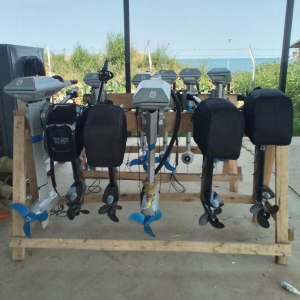Comments (0)
Written by: Rachel Ajambo (ENGIE Equatorial), Ronald Bukulu (ENGIE Equatorial)
Part 3: Social and economic impacts on local community
Introduction
It has been 10 months since ENGIE Equatorial commissioned the Lolwe mini-grid on Lake Victoria with a vision to provide energy access to over 3800 connections in the community. ENGIE Equatorial has supported the development of e-mobility through electric boats that has enhanced the different value chains under agro processing, specifically fishing.
The PREO programme co-funded by UK-Aid and IKEA Foundation allowed ENGIE Equatorial to successfully deploy the electric outboards for the boats. With 15 e-outboards, the commercial operations started in February 2022 and we have since seen fishermen utilizing them consistently to date.
Two previous disseminations investigated the technical, environmental, and economic aspects of the project [1]. This third analysis presents the impact the project has had on the community on Lolwe island, Lake Victoria. The assessment was carried out through community meetings, interviews with the different stakeholders such as the fishermen, community leaders and influencers.
Other conclusions were made through observations by the ENGIE Equatorial support teams currently working on site.
At the time when the e-outboards were introduced, the fishermen perceived them to be a weaker option compared to the Internal Combustion Engine (ICE). This was because the electric engines were silent on water and appeared to be slower. In addition, there were concerns on the weight of the battery and the perceived inconvenience to recharge it. However, after a series of community engagements and training the fishermen adapted to utilizing the e-outboards. The fishermen were trained and ambassadors identified to create more awareness amongst their circles as they got hands-on experience with the e-outboards. Through this, the fishermen in the different villages adopted and have been using the e-outboards and enjoying the benefits below:
Economic benefits
Previously the fishermen only recharged the batteries at a fee via the charging station installed at the Productive Hub run by ENGIE Equatorial. To promote flexibility, it was decided to set up three other charging stations across the island. This initiative enables fishermen to recharge the batteries at their convenience as opposed to sailing all the way to the Productive Hub and encompasses fishermen from different landing sites on the island. This also prevents an early retirement from their fishing activities per trip and reduces energy consumption for transport.
1) Reduced operating costs: the fishermen have realized savings on their fishing trips. At the moment a client can pay a rental fee for using the e-outboard and a fee to recharge the batteries as opposed to buying fuel. In the future, leasing-to-own models might be explored. On fuel, for a short trip a fisherman would spend 50,000 UGX (around 13 US$) on fuel. Currently with the e-outboards, a fisherman spends 25,000 UGX on the same trip saving about 50% of fuel costs.
2) Reduced maintenance costs: additionally, maintenance costs have reduced. Previously, a fisherman would spend an average of 60,000 UGX (around 15.65US$) per month on maintaining the ICE engine while currently ENGIE Equatorial incurs the e-outboards maintenance costs.
Considering both operational and maintenance costs, assuming 15 trips per month, the customers using e-outboards are currently spending around 375,000 UGX (112 US$) per month, which represents the 46% only of the 810,000 UGX that they would spend with ICE outboards. This clearly can vary according to the number of trips, type of boat, season and distance covered by individual customers.
At the same time, ENGIE Equatorial has the benefits of repaying the cost of the asset, covering the salaries, operational and maintenance costs for the outboards, and generating a stable anchor load for the mini grid.
3) Increased livelihood resilience: Fishermen on Lolwe now have an alternative to conduct their fishing operations, which also allows them to mitigate costs in case there is an increase in fuel prices. The e-outboards service has offered access to cheaper and renewable energy. In the long term it is reasonable to expect that a wider and more consistent substitution of ICE outboards with e-outboards will ensure lower prices, increased environmental and financial sustainability for the fishermen and hence business resilience.
Social benefits
1) Enhanced livelihood: Due to the reduced costs on energy under the e-outboards, fishermen have registered savings that can potentially be utilized for other expenses like education, food, electricity.
2) Job creation: The application of e-outboards has created job opportunities for the people on the island. Currently, ENGIE Equatorial employs 2 operators and 1 record keeper for this service, also the customer care agents, technicians and HQ team support the processes when needed.
3) Gender inclusion: furthermore, this project has promoted gender inclusion, in a mostly male-dominated fishing community. ENGIE Equatorial pursues a gender inclusion policy, in Lolwe we have been able to achieve 33% of female presence among the employees. The team has also observed an increase in the number of female boat owners utilizing the e-outboards, with the most loyal client being female.
4) Reduction of pollution: the reduction of pollutants emissions to air, water and soil derived from fossil-fuel use (see the previous article Part 2 of this series for more details on environmental assessment) implicates a reduction of general health hazards to local communities. In particular the reduction of fuel leakage to the water would reduce the hazard to marine life and generally improve the state of health of the lake, and subsequently improve fish quality for consumption.
Overall, the application of e-outboards has improved the livelihoods of the fishermen through providing a reliable, affordable and quality source of energy to run their boats.
References
[1] https://equatorial-power.com/uncategorized/e-mobility-for-fishermen-on-lake-victoria-2/
